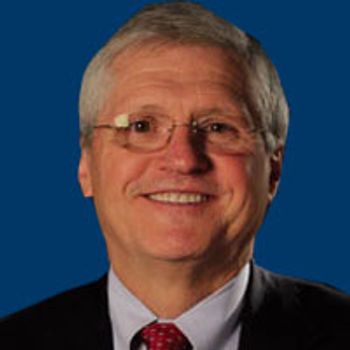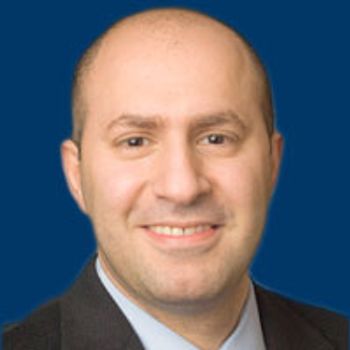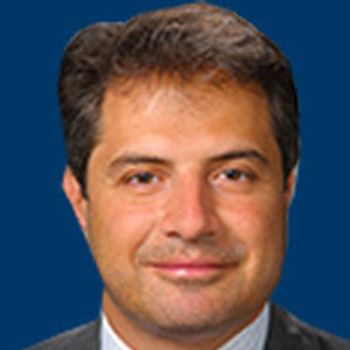
Lung cancer treatment has undergone a game-changing transformation within the past few years, with a burst of FDA approvals of targeted agents and immunotherapies across a number of indications.

Your AI-Trained Oncology Knowledge Connection!


Lung cancer treatment has undergone a game-changing transformation within the past few years, with a burst of FDA approvals of targeted agents and immunotherapies across a number of indications.

The dual inhibitor combination of lenvatinib and everolimus is becoming an essential second-line treatment option in advanced renal cell carcinoma, and research to move the regimen into frontline settings is underway.

Toni K. Choueiri, MD, dives into the ongoing research with volitinib, the competing yet complementary roles of targeted agents and immunotherapy, and the most important steps to take with biomarker research in the field of renal cell carcinoma.

When envisioning the future treatment paradigms for myelodysplastic syndromes and acute myeloid leukemia, researchers predict that hypomethylating agents, immunotherapies, and multikinase and BCL-2 inhibitors are just a few examples of what the field can expect in the coming years.

Both myelofibrosis and polycythemia vera are myeloproliferative neoplasms with very specific characteristics and treatment strategies.

Surgery and radiation therapy are standard treatment options for localized prostate cancer, but are not comparative to one another.


Although nivolumab has demonstrated a clear survival advantage compared with chemotherapy in patients with progressive non–small cell lung cancer who express PD-L1 in their tumor cells, the same cannot be said for those who are PD-L1–negative.

Novel agents being explored in the landscape of both peripheral and cutaneous T-cell lymphomas could lead to an expansion of treatment options for patients.

Before undergoing surgery, radiation therapy, or a systemic treatment, Clayton S. Lau, MD, advises that the active surveillance approach for some patients with early prostate cancer is likely a more effective approach—but they should be better educated on it.

As more agents are approved in the treatment paradigm of chronic lymphocytic leukemia, researchers are exploring frontline options—in addition to ibrutinib and the regimen of fludarabine, cyclophosphamide, and rituximab—in ongoing trials.

Kimberly L. Blackwell, MD, discusses the latest advances for patients with HER2-positive breast cancer and provides insight on the hurdles that still remain.

Patients with chronic lymphocytic leukemia have an increased likelihood of developing secondary cancers and other diseases, often based on their age and gender.

Surgical treatment of patients with non-muscle invasive bladder cancer can be considered a curative option, but the associated risk in comorbid patients is leading researchers to further explore the option of immunotherapy.

Patients with large cell lymphomas have a standard approach of R-CHOP; however, those who fall under the activated B-cell-like (ABC) subtype are not likely to respond well to the regimen.

As the fields of renal cell carcinoma and bladder cancer continue to dramatically progress with the approval of novel agents—both immune-based and targeted therapies—oncologists need to improve their methods of selecting patients to receive such available therapies.

Increasing subsets of patients—both adult and pediatric—with acute lymphoblastic leukemia are being administered therapies designed to target their molecular subtypes, according to Elias Joseph Jabbour, MD.

Since the auspicious 2010 FDA approval of sipuleucel-T as the first immunotherapy vaccine for cancer, advancement with immunotherapy has been slow in the field of prostate cancer.

Ranee Mehra, MD, provides an overview of ALK inhibition in non–small cell lung cancer, an observation of the most common treatment-related adverse events, and what impact in-development agents will likely have on the expanding field.

Przemyslaw W. Twardowski, MD, describes the available therapies for patients with advanced metastatic castration-resistant prostate cancer, including bone-targeted therapies; the work that still lies ahead with these treatments; and the challenges with finding biomarkers to help develop targeted agents.

Howard M. Sandler, MD, sheds light on maximizing outcomes for patients with locally advanced prostate cancer, the evolving role of chemotherapy, and the steps to take once disease turns metastatic.

Tracey L. Evans, MD, shares her perspective on the role of PD-L1 testing in lung cancer. She also discusses the role of liquid biopsies and other assays that could possibly be on the horizon.

Hossein Borghaei, DO, provides additional insight on checkpoint inhibitors, determining patient selection, and how these therapies will continue to significantly impact the treatment landscape in non–small cell lung cancer for years to come.

From optimal therapies for patients with non-driver adenocarcinoma, to studying the biology of squamous cell non–small cell lung cancer, to exploring novel combination regimens, to predicting the risk of mortality, the field of lung cancer is undergoing tremendous changes, explained Corey J. Langer, MD.

The SPINET trial is an international, phase III, randomized, double-blind study evaluating the efficacy and safety of lanreotide (Somatuline Depot) plus best supportive care compared with placebo plus best supportive care in patients with well-differentiated, metastatic and/or unresectable, typical or atypical lung neuroendocrine tumors.

Joshua Bauml, MD, discusses the evolution of EGFR-targeted therapies, resistance mutations in patients with non–small cell lung cancer, the evolution of next-generation sequencing, and ongoing trials that could have an impact in this space.

The c-MET inhibitor capmatinib (INC280) demonstrated early signals of efficacy with an overall response rate of 20% when administered to patients with advanced c-MET–dysregulated non–small cell lung cancer.

Elizabeth Plimack, MD, discusses some of the most impressive advancements with immunotherapy agents in the fields of renal cell carcinoma and bladder cancer, as well as remaining questions with the use of these treatments.

After updated findings from the landmark Prostate, Lung, Colorectal, and Ovary screening trial were presented earlier this year, members of the oncology community strongly suggested that the United States Preventative Services Task Force revise its views on prostate-specific antigen screening for patients with prostate cancer.

Yvonee Saenger, MD, discusses ongoing developments with immunotherapy in melanoma.